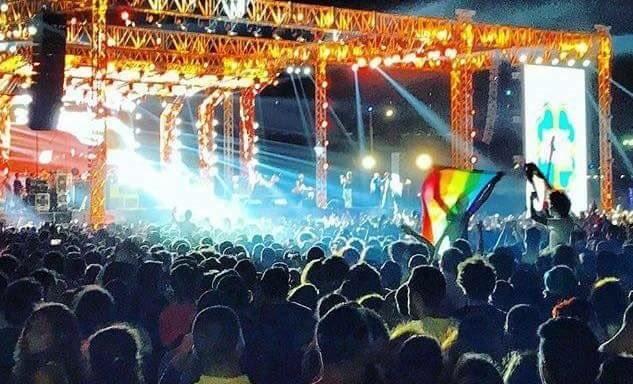Sarah Hegazi will be remembered as someone who just wanted to be herself — and was imprisoned and tortured for doing so. On Saturday, the Egyptian LGBTQ activist died by suicide in exile in Canada. She was 30 years old.
Hegazi’s friends trace the lead-up to her death to a moment in 2017 during a music festival in Cairo. As the Lebanese band Mashrou’ Leila played, Hegazi hoisted a rainbow flag above the crowd — a daring move in a country where homosexuality is taboo. A friend took her photo, and Hegazi became famous after the image spread across on social media.
But Hegazi’s friend, Aya Hijazi, says that moment came back to haunt her. The two women are both activists who have spent time in Egyptian prisons.
Hegazi was arrested after her photo spread on social media. Upon her release, she fled to Canada, where she was granted asylum.
“She told us, I always felt depressed and not able to express myself, and I wasn’t trying to make any political statements, I wasn’t being courageous, I was joyous,” Hijazi told The World.
Today, activists in Lebanon, Egypt and Syria are remembering Hegazi. Upon learning of her death, Hamid Sinno, the openly gay lead singer of Mashrou’ Leila, sang a few stanzas in her honor — taken from Hegazi’s own last words.
Hegazi posted these lines online before her death: The sky is more beautiful than the Earth. And I want the sky, not the earth.
The World’s Marco Werman spoke with Hijazi about how people Hegazi is being remembered and the consequences of her decision to wave the rainbow flag.
Related: Egypt is raiding its LGBTQ community after rainbow flags flew at a concert. The West is silent.
Marco Werman: Aya, take us back to 2017, if you would, and that moment when a friend of Sarah’s snapped that picture and what became an iconic photograph. The Lebanese pop band Mashrou’ Leila just taken the stage at a festival in Cairo. What happened?
Aya Hijazi: Right. She raised that flag and then some people put it on social media. It wasn’t her. And then after that, people posted it, it was a week later that she was arrested. She was sexually harassed by the authorities. And she was asked very private questions. She was electrocuted and she was tortured just because of raising the flag, nothing else.
Which was a horrible experience and a complete 180 from the kind of jubilation that she was feeling at that concert, right?
I think that was the last moment of joy she ever felt. She was taken afterwards to solitary confinement as well. And then she was placed with two women in a cell, and they were forbidden from talking to her. And then ultimately, of course, she was deported and made to leave Egypt. And her mother died, as well. And so she just felt depressed afterwards.
How did Sarah get out of prison in Cairo?
There was advocacy for her case, and then she was just released. She wasn’t acquitted. And then she was basically deported, never allowed to go back home. And I want to say that she never felt comfortable living in exile. She told us repeatedly that she wants to go back home, even if she’s going to go back to prison.
Related: Egypt is ramping up its harsh crackdown on the LGBTQ community
She then struggled with depression and she took her life this past Saturday, what’s been the reaction in Cairo to her death?
I mean, it is mixed, an unequal mix, with 90 percent of the people just being vile. [But] fellow activists and friends said if this was 10 or 15 years ago, no one would have been outspoken in her support. But now, even 10 percent are able to be outspoken and really speak their opinion freely about the issue and even changing their profiles to the rainbow flag. It is very taboo. That is change. And we think this change is made by Sarah. So she left, but I think her legacy for rights and freedoms and peace and love will live past her.
We’ve been reflecting on the Supreme Court decision here in the U.S. to support protection for LGBTQ people in the workplace. Clearly, different countries are seeing the urgency for LGBTQ equality and justice through different lenses. When you think about what needs to be accomplished in Egypt, where do you even begin?
In America, all of this happens, even legislation banning discrimination, it’s because of democracy. It is because there is freedom of speech and you can’t have rights, if you’re ruled by a tank and a government.
Aya, you spoke about the legacy of Sarah. What do activists in the Middle East do with this moment?
So people are arranging vigils for her in Beirut. They’ve already lit candles for her yesterday, even in Syria — it’s war-torn and people are dying. Because she was a strong supporter of Syria, Syrian activists did a vigil for her and raised banners. A lot of people really loved her and came out in support of LGBTQ rights and this was the first time that I seen Egypt people changing their profiles to the rainbow flag.
This interview has been condensed and edited.
